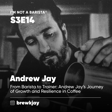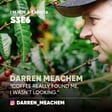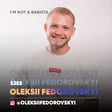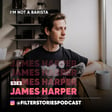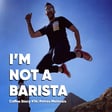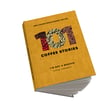Become a Creator today!Start creating today - Share your story with the world!
Start for free
00:00:00
00:00:01

S2E7: Meet Lars Aaen Thøgersen, coffee specialist in business innovation and sustainability
Lars Aaen Thøgersen is the Chief Innovation and Circular Transformation Officer at Löfbergs, and Head of Communication at Peter Larsen Kaffe. Lars’ primary mission in the coffee industry is to determine what is needed to innovate businesses in a way that gives back value to coffee farmers in a sustainable way.
Read Lars's coffee story
https://notabarista.org/lars-aaen-thogersen/
MOMENTEM dual-burr manual coffee grinder
https://www.indiegogo.com/projects/momentem-dual-burr-coffee-grinder-for-coffeeholic/x/23239695#/
Coffee Wristbands
https://coffeewristbands.com/
Meet us at Mice and The Barista League competition
https://notabarista.org/a-piping-hot-cup-of-female-empowerment-goes-overseas/
Support the show
Read more coffee stories on
https://notabarista.org/
Order Coffee Wristbands and support I'M NOT A BARISTA's charity work
https://notabarista.org/product/notabarista-coffee-wristbands-2023/
Transcript
Podcast Introduction & Themes
00:00:07
Speaker
Welcome to the I'm Not A Barista podcast. We're here to talk about all things coffee from industry careers, brewing tips, community support and more with some really incredible people who love coffee as much as you do. Because humanity runs on coffee and together we can empower all the people behind every cup.
Momentum Duber Coffee Grinder Success Story
00:00:32
Speaker
Hello, everyone. This is Miki, your host of M Now Barista podcast. I'm sorry that it has been a while since our last episode. As you may know that we have been working really hard on a very, very cool project, Momentum Duber Coffee Grinder. It was a big success. And thank you all. If you are one of the supporters, I want to say thank you so much for helping us making this project possible.
00:00:57
Speaker
If you unfortunately missed the Indiegogo campaign earlier, you still can back this project today. So pre-order the momentum in Duberg Reiner and experience two-step grinding with us.
Upcoming Coffee Book & Events in Melbourne
00:01:09
Speaker
And very soon, we are going to launch our next coffee project, one-on-one coffee stories. This is a book, a collection of all the coffee stories featured on Amna Barista. And what is more, next week, we will be in Melbourne, Australia. And we'll be at the Mice. Thank you RMD to lend us a small place so we can start our coffee respond fundraising there. And thank you Barista League.
00:01:38
Speaker
And we'll be there. Compete. Teaker will be there. So join us, get your tickets today at the Burst League. It's going to be fun. Really, really fun to see I'm the Burst to compete at the Burst League. And we are there, not just for competition.
00:01:54
Speaker
We're there to raise funds for a female coffee organization in Mexico. We will launch our latest coffee wristband and we aim to raise $500. So meet us there, grab the latest design of a coffee wristband and help the coffee community. We would like to see you there.
00:02:15
Speaker
So, back to
Lars Oentrudsen's Sustainability Journey
00:02:17
Speaker
the podcast. Actually, we recorded this episode a while ago. We invited Lars Oentrudsen. He is the chief innovation officer at Luke Bex and also the head of the communication at Peter Larsen Coffee. Lars himself was a barista for years and he has been working the coffee world for almost two decades.
00:02:37
Speaker
as a specialist in coffee and the coffee sustainability. And in this episode, we talk about a very interesting topic. Can we pay more coffee to help coffee farmers? Does it work? And how to help coffee farmers as a coffee consumer? All right.
Does Paying More for Coffee Help Farmers?
00:02:57
Speaker
So welcome to the show, Les. Thank you very much.
00:03:00
Speaker
So we got to know Juthu's changer. And the reason why, because we asked her about a topic that is kind of trendy lately in the coffee industry on social media. People ask, pay more money for the coffee the drink can help farmers. So we thought it could be a very interesting topic, but we need to know who is the specialist in this part of knowledge.
00:03:27
Speaker
And then somehow we got to know you here, we're connected. So Lars, tell us about yourself, what I've been doing since you are especially in the coffee sustainability, this topic.
Lars's Career Evolution & Sustainability Focus
00:03:41
Speaker
Sure. Yes. And thank you for inviting me in. My name is Lars and I am a Danish citizen. I live and I work in Denmark.
00:03:55
Speaker
for a company called Peter Larsenkafer. But actually on top of that, I'm also part of Lifberg's group, a Swedish company, working with innovation and sustainable development. And if I should just brief some of my background into this. Basically, I was an entrepreneur in my young days. I started
00:04:25
Speaker
a number of companies myself. And I was working at a certain time, that's now we're about 20 years back. And I was working with a sales company that I set up and I got the distribution of Seiko fully automatic machines into the Nordic countries. And that really got me into the Italian coffee style and the Italian coffee lifestyle in general. And I had some very good and interesting years working with
00:04:55
Speaker
Italian machine engineers, coffee machine engineers, and also got into the Italian roasting industry and started importing both machines and coffee into Denmark. And after a certain point, I got into the, I mean, I got so attracted to the coffee lifestyle that I wanted to also work, I mean, to have my hands physically into the
00:05:23
Speaker
into the handcraft ship. So I actually invented my own coffee shop business. I started a mobile business unit in Denmark. And after a while, it was, I mean, that turned out very successful.
Complexity of International Coffee Trading
00:05:42
Speaker
And we got into all the festivals and I was working there as a barista in my own company. Oh, interesting. So you're a barista.
00:05:53
Speaker
I am actually, I've been working for several years as a barista while I was running my own business. After a while, I got the opportunity and I was offered an interesting deal, I mean, to become part of this organization of Peter Larsenkofer and Luftbacks, because that mobile coffee shop department was something that could really be helpful for
00:06:23
Speaker
for these brands in order to reach out to consumers and not just being a brand in the retail stores. So I joined there and I've been here now 10 years. In the beginning, I was building up the mobile coffee shops. I got more and more into what I am now so deeply concerned about.
00:06:52
Speaker
sustainable developments I got altered into. I mean, I was attracted to the, what we call the downstreams part. I mean, I was attracted to the lifestyle of coffee, the taste of coffee, the different varieties of coffee. I mean, the work and the life as a barista and meeting consumers, but the more I got into coffee, I also got more and more interested in all the paradoxes that coffee also contains.
00:07:22
Speaker
and started working more and more intensively with sustainable development projects and initiatives. Had some tremendous years working both in Kenya and I've also been running some projects in Colombia and other places. And I mean, that's most of what is filling my work days today. That is actually how can we innovate
00:07:53
Speaker
the business, how can we make new business proposals both to maintain the overall interest in coffee, but what is so desperately needed is that we innovate our business in a way that is giving back value to farmers. In
Coffee as a Commodity: Challenges & Solutions
00:08:14
Speaker
short, it's like 20 years in a rabbit hole of coffee, right? You never can get out of there. No, but it's a fascinating tool.
00:08:23
Speaker
Honestly, I believe that my work is also my hobby. I mean, it's not equally fun every day. There are a lot of troubles and a lot of paradoxes and a lot of conflicts during the way, but in general, it's really, really interesting.
00:08:42
Speaker
Yeah, must be. I guess that's one of the main reasons why coffee people never left the coffee industry, regardless how much they got paid for the job, especially baristas. So to this topic, we want to explore a little bit the coffee industry, how the money flows. Like earlier, the topic is, can we pay more for our coffee? Somehow this can help the farmers. I think that, I mean, there is a lot
00:09:12
Speaker
to talk about, I probably will not be able to give you the answer. Yes or no. No matter how long this conversation will go on. Because seen from outside, it seems pretty simple. Why not just pay more and the farmer gets more? But it is a complicated and complex system. I mean, the reason for that is that
00:09:41
Speaker
Coffee is, I mean, it's one commodity. I mean, that's when I say commodity, that one part, that's one part of the problem is that coffee in as a whole is seen as a commodity. And we just say it like coffee is coffee, but coffee is not just coffee. And there's big difference. I mean, everybody interested. I mean, all baristas know that everybody in the specialty coffee industry knows that, but that's not the majority of people.
00:10:09
Speaker
So let's say at least 90% even much more, probably 96, 97% of the global population drinking coffee, they don't have a clue. That's a big issue, isn't it? That is a big issue. But that's, I mean,
Layers in the Coffee Value Chain
00:10:29
Speaker
seeing coffee as a commodity, that is one problem. But in kind of on the same track,
00:10:38
Speaker
We have that issue of coffee being a global traded commodity, which is traded at, I mean, the prices are basically set at the big stock exchanges, primarily in New York and in London with the Augusta. But the coffee is, it's considering that big consumption part of coffee, it's a
00:11:07
Speaker
It's a complicated international trading system. And to put it, I mean, what that trading system is giving is that, I mean, to us as Western companies trading coffee, it gives us kind of stability, gives us a measuring tool. We can kind of monitor coffee from different regions of the world and we have a
00:11:37
Speaker
kind of equal system to compare coffees to farmers. I mean, it brings also value to farmers with this system. But in general, it keeps prices low because I mean, even though supplies in some times are low compared to demand, which normally shoot
00:12:01
Speaker
bring prices up, and it does, but normally just for a short period of time, because then, I mean, most coffee companies, they can replace their orders and they can, I mean, if Columbia is high, then they can find coffee somewhere else. And that's trading system is kind of equalizing the price levels.
Fair Trade & Transparency Issues
00:12:22
Speaker
And that's the volume market now I'm talking about. That is in many senses, I mean, it's good to maintain stable businesses.
00:12:31
Speaker
It's not necessarily so good if you're a specialized farmer somewhere and you have some quantities, I mean, that are better quality than what you get paid for because the buyer, he went somewhere else because there it was cheaper. This is a very simple way of putting the system, but it's actually trying to make it a bit simple because it is, I mean, there are so many different aspects
00:13:01
Speaker
into this and could probably be different if we didn't see coffee as just coffee. What I think we should see coffee as, let's say is not kind of commodity, but how we can identify coffee. I mean, each coffee, each region has a speciality and it has a special story.
00:13:31
Speaker
special reason for being at the price and the quality and, and I mean, the, the, the characters, the special characteristic and so on. And in, in the perfect world, we would understand and appreciate that not just the 2% dealing with specialty coffee and buying specialty, but, but also everybody else.
00:13:57
Speaker
But in that sense, coffee is not much different than many other commodities. I mean, products in general, who knows what, how are the workers with your iPhone? What are they paid? I mean, what is the real price of an iPhone? You don't know.
00:14:14
Speaker
What about the food that you eat, the meat, the dairy products, and so on? You don't know. You don't have a clue. True story. I noticed that on the front page of the circular coffee community, and there's one sentence mentioned that on the top section highlights the unfair share farmers get. They receive only 0.4% of the money, which is on coffee, 0.4%. That's very little. That is very little.
00:14:44
Speaker
And that's like an average figure. And that's, I mean, if you enter the shelves in a supermarket and you buy it there, of course there are, I mean, you can do the calculation downwards. And I mean, there are transparency and transparent systems and there are also, I mean, you can Google coffee calculations and you will find some examples how is the value distributed.
00:15:11
Speaker
But that is on average, yes, what the farmer gets. That's not a lot. And I do agree on that.
00:15:20
Speaker
Right now, I'm looking at one of the presentations that I showed on the internet. I found this part on YouTube when you mentioned the Columbia Coffee Supply Chain. There are several main players in there. We have a production, purchasing point, treadmill, export, import, roaster, and coffee shop. There are a lot of people involved.
00:15:41
Speaker
in a cup of coffee. And for most of us, let's talk about especially the coffee community. I think we know it very well. And people know coffee better. How do we understand where all the money goes? Let's say 100 Danish corner for a 250 grams of coffee.
00:16:06
Speaker
0.4% of the money goes to the farmer, I suppose could be a little bit higher. Where's most the profit goes to? As you see also, I don't know exactly which figure you're referring to, but just any value chain in coffee, you would see that, I mean, the number of layers and the layers. I mean, sometimes we talk about the layers as just being
00:16:37
Speaker
root parts, almost stealing money from the farmer. But there are many layers, the milling and the exporting, the marketing. Here also in the Western countries, roasting, distribution, marketing again, sales staff, and so on. Of course, there are a lot of costs related to running a value chain. And especially if you have more parts in it, the more parts, the more
00:17:07
Speaker
the more broad spread of value you see. And of course, I mean, each layer put on a certain percentage. That percentage, I mean, if you start with a very low value and every time you put a percentage, the prices go remarkably up. If, I mean, for sure, I mean, the last step is always a step that has the highest, not necessarily income, but margin.
Blockchain for Coffee Market Transparency
00:17:36
Speaker
you know, the highest revenue. And so you have to take it from there and then go back. But the lack of transparency, you can say then, I mean, if you have many layers and you're not able to see, I mean, who's getting what. So we have to figure out exactly what is the price paid to the farmer. And you have also systems making that information available. As you said, I was introduced to you by
00:18:06
Speaker
by Chandra from AirFV, they have a system where you can actually trace the coffee and you can see what was the, what was the coffee bought at? What was the price paid to the, I mean, that's, but then again, what, that's the FOB price. What's the price? And then you have a number of services that are included into that price, but basically that's the price that you normally compare, but even the FOB price, I mean, then you have,
00:18:35
Speaker
I mean, if it's in a cooperative, for instance, probably the cooperative would take care of the milling part, sorting part, maybe some sales and marketing activities, which will also be add-on. So you have to take that out of the FOB price to understand what does the farmer get. That price is very difficult, I mean, to get into. And then you have, below that, I mean, you have, okay, this is,
00:19:02
Speaker
If you then know what is the amount of money that is paid to the farmer, but what then with all the seasonal workers that are there, I mean, working on the farm, what did they get paid? That's 0.4% for sure. So it's a huge system. We also need to understand that coffee is the second most traded commodity in the world. Exactly. It's a big business.
00:19:28
Speaker
And there are a lot of people involved. And it's super complicated. Once you talk about a public traded product like coffee commodity, there are so many people involved. And the stock market is strong. The strong hand here can have a huge influence.
00:19:47
Speaker
I don't think it's pure supply and demand market anymore. Because the main power doesn't appear to be on the hands of the farmers. The supply anomaly, it could be like that. But in this case, it's not. I remember you talk about blockchain technology, how to use blockchain technology to enhance the transparency of the coffee industry. I think this is very ideal
00:20:12
Speaker
or way we can make the market or industry more transparent so we can see how we can improve it than how the people in this chain who are really in need.
Improving Coffee Traceability
00:20:24
Speaker
But why, if this technology can help, what stops us using it? That technology, I mean, we spent lots of efforts and energy into investigating the blockchain and we've been running scientific studies in that field.
00:20:42
Speaker
And for sure, the terminology in the blockchain is promising. The technology itself is not as I see it as we see it. It's not mature yet. And it also has, you can say, environmental climate issues related to it. I mean, the energy consumption related to it is enormous.
00:21:11
Speaker
And, and that's also something that is drawing back the use of blockchain. And, and it's, it's actually a pretty expensive system. I mean, if you want to use it another, I mean, probably the most important issue is that blockchain is, I mean, it's not bad. I mean, we used to say, I mean, shit in, shit out. You also have this offline online transaction and you need to type in data.
00:21:41
Speaker
at a certain point, if that data is not correct, it's following the coffee all the way. So even a blockchain, which is communicated and marketed as a bulletproof system, it's not. It's just bulletproof and even that can be argued, but it's bulletproof from the point where you have data in a register.
00:22:08
Speaker
But who is to enter that data? And what is the correctness of that data that you have to control as well? In fact, I actually think that the coffee business has a pretty traceability in coffee is really, really a strong point in the coffee business. If I look into our business, if I could look into our supply chain in Luftbags and Peter Larsenkopf, for instance, we can trace every single coffee all the way back to the farm.
00:22:37
Speaker
that traceability system, that is a manually driven paper writing system. That's a lot of effort and high cost just to get the traceability available. It is, but basically it's the manual part that blockchain in the current setting, where we are now in the development of blockchain, that is that we can digitalize that manual process, but we haven't seen
00:23:06
Speaker
that we can improve that process with blockchain. We can make it more accessible. Sorry, that's an improvement. The data is easier to broadcast or put them on your website and you can follow. Of course, that is an achievement. That is a good part of the blockchain. But basically, the transparency and the traceability at least is not being, as I see it, improved.
00:23:35
Speaker
All right.
Consumer Awareness & Coffee Pricing Impact
00:23:36
Speaker
Just to talk about the Peter Lawson, and you have a lot of data about the traceability, you can trace all the way back to the coffee beans or seeds. Based on your experience, how do you think the customers, the buyers, the consumers appreciate this information? Do they really care? Some do, 90%. But in a country with a high level of information and pretty well educated,
00:24:05
Speaker
like Denmark, it's still like 90, approximately 90, 85, 90% of all coffee sold here is sold on campaigns with price as the primary driver. But you have, let's say then five to 10, let's say 10% who are interested and you have, let's say the most concerned 5%, they're really concerned and they know a lot.
00:24:36
Speaker
And it's also those 5% that we kind of need to, to brought out the awareness about the complexities. But it's just, then you're coming into a part of the coffee industry where it's also often said this comment, which you started out, why don't, I mean, why don't you just pay more? That's simple. Then the farmer will get more. But it's, but you don't necessarily, I mean, of course, if you can trace a coffee back and you can see what was it,
00:25:05
Speaker
price paid at farm level, then you can of course see that, okay, I pay extra and the farm get extra. And I have it here, it's transparent and I mean, it's proven. Okay, case closed, you're paying more. But, and that's the big part. You can, let's say I walk into the coffee shop at the corner and they tell me, listen, I pay 50% more, 100% more for my coffee.
00:25:35
Speaker
And then they pay two bags of coffee because consumption is not, I mean, it's not really industrialized. It's a small production. They buy maybe two bags of coffee at farm level. They pay premiums. They buy the premium coffee at the farm. And the farmer is happy. He gets, let's say 50, 100% more than average, but it's not covering the costs of driving the farm.
00:26:03
Speaker
And what about the coffees that are lower grades? What about the volumes of coffee? Normally a farm that would have quite a low amount of premiums. And those are not the ones paying the bills. That is the quantities that you get. You are also lower grade coffees sold at a good price.
00:26:29
Speaker
So even paying more for the premiums might not secure the farmer.
00:26:35
Speaker
So we are talking about a number of games here, right? Let's say some farmers, they have premium geisha there, but only shares 5% or 6% of the total production. Yeah. So there's still 95% of coffee to enter 80 SDS score, and they cannot sell at the premium price. So those 5% of premium margin cannot save the whole farmer. So that's the truth. Am I right? Yeah.
00:27:05
Speaker
I know that one of your topic, the sustainability, and as someone who used to live in Denmark for 10 years, that's a big deal. Organic sustainability, the future of grain, those what we care about. You mentioned one thing, 1% of the coffee resources we only utilize, there's still 99% of potential we haven't discovered
Circular Coffee Community Introduction
00:27:26
Speaker
yet. Can you tell us more about that? Yeah, sure. And I'm glad you're bringing up this topic because
00:27:32
Speaker
That is actually something that we've put our eyes very close into because we see this complicated, big international trading system. I mean, that's not, I mean, we as a company, we cannot change that. If we then look into our, our resource that we have in hand, then it's really correct that the nutritional value, when you drink a cup of coffee, you only extract
00:28:00
Speaker
And that's just when drinking the cup of coffee, you extract less than 1% of the nutritional value. The remaining parts actually are left in the spent coffee grounds. And that's, I mean, now I'm just talking about the spent coffee grounds at consumption level. I mean, luckily enough, and really something we appreciate very much is that we have such a
00:28:24
Speaker
an inspiring entrepreneurial, you can say, movement going on here in the Nordic regions. And we see many new startups coming up, working with spent coffee grounds in different ways and so on. And we support that. But we set up because we see that's just 1% when drinking the coffee. In fact, we have in throughout the supply chain,
00:28:51
Speaker
a huge number of resources that are not being used today. I used to say that compare the coffee industry. I mean, if we were the meat industry and it's not that I'm, I'm not very fond of comparing ourselves into the meat industry because coffee is, is.
00:29:13
Speaker
in many senses, I think, at least it's to me a more attractive industry than meat, but comparing ourselves to the meat industry, if we were, we were the ones cutting out the tenderloin and just throwing away the cow. So basically we are just using the beans for roasting and drinking the coffee, but we leave back so big
00:29:38
Speaker
opportunities and resources that should be used for other income streams. And there, I mean, just looking at farm level, I mean, farm level is, I mean, that's where we have the farmers who needs more value. And we are throwing away Cascara leaves, water from the wet mill fermentation. I mean, there are a number of different parts, there are resources there that if we wanted to,
00:30:09
Speaker
as an industry, we could make so much better use of. And we are confident that we can secure better livelihood and new income streams to the farmers. So that's why we set up the circular coffee community, which is a community. Basically, it's a nonprofit community in which it's us reaching out our hands. I mean, if you join our vision of becoming
00:30:38
Speaker
or transforming the coffee supply chain into a circular supply chain, then please join us and be part of the solutions within that community.
Sustainable Business Model Innovations
00:30:49
Speaker
We do innovation that will lead to the circular transformation of coffee as an industry. We've built up a billion dollar industry and we have just been doing that using
00:31:07
Speaker
far less than 1% of the value that we've had in our hands. Yeah. I really like the example you compare coffee with the meat, of course not very complete industry. And it reminds me some story that I remember when I was in Denmark, I knew that Denmark, the most popular meat is pork.
00:31:29
Speaker
But Danish don't eat all the parts of the meat. So like the pig heads, the toes, the tails, the feet, mostly they are exported to countries like Asia, China, Philippines, where consumers like them. So actually in this case, we don't really waste any part of the meat and use the same theory on the coffee industry.
00:31:53
Speaker
Most of the resources we are using, let's say you mentioned the water, we use fermentation, et cetera. They are in the poor countries where we grow coffee. The coffee grounds after we burn our coffee, they are in the developing countries. How we can connect this? Maybe you can give us some example how we can really utilize this without having farmers investing a lot of money to utilize their resources they're currently not using.
00:32:23
Speaker
No, we need a Western companies like ourselves to understand that. I mean, we need to increase investments in the development of these, I mean, in new business models. And basically, I mean, I think those days when, when we should see that this is like of its development today, also with the understanding of the sustainable development goals and so on.
00:32:51
Speaker
We as Western companies just see this as a way of how we invest in the commercial building of our businesses. But we should do it in partnerships with the farmers. I mean, yes, we want to improve livelihood. We want to improve living standards in general in the regions where we are working. But also, it's actually taking care of your commercial business.
00:33:18
Speaker
So when we are working in this, of course, we also see that if we can develop new kind of income streams, new kind of applications, new solutions and products and so on at farm level, we would also get access to new kinds of businesses as we as a business while we are making better income to the farmers. So we have to see it as a commercial investment. I'm a firm believer.
00:33:48
Speaker
in that part, that I mean, we need to develop ourselves as businesses and we need to develop the farmers as businesses.
Empowering Small-Scale Farmers
00:33:57
Speaker
That is another complexity in our business. 70% of the coffee traded in the world is grown by small scale farmers, often small families, often with a low educational degree.
00:34:16
Speaker
And we're kind of trying to set up those farmers with huge industries. I mean, it's an unequal, you know, a game. So, so we also need to empower, we need, I mean, we need to take better care that we empower the farmers and to do so. Price is one thing, but there is so much more to it. Like what we just talked about, get into new businesses, better usage of your
00:34:46
Speaker
if byproducts are your side streams. But in general, I mean, how do we secure the educational level? How do we secure diversity, equality? I mean, also the elements that are so relevant in order to empower the farmers. Could we get more secure, more female managers at the farm level? That alone would increase
00:35:14
Speaker
the farmer value, because it's proven that female managers at farm level are better at taking long-term care of the business. That is also an instrument that we need to look into. And now I'm kind of getting into the complexities. It's not just about the price. It's also how you take care of the environment. How do we secure better agroforestry systems? How do we improve organic growing in order to have a longer-term perspective?
00:35:45
Speaker
If we want to do more and better business to the farmers and we want to secure better incomes to the farmers, we have to think about it in a holistic long-term view. And we need to assist in improvements that are broader than just a
Circular Business Models at Farm Level
00:36:08
Speaker
simple transfer price.
00:36:10
Speaker
It's a very hard, but very interesting topic, I have to say. And for normal coffee consumers like me myself, I buy coffee from local roasters or...
00:36:20
Speaker
roaster from other countries, and they pay the price, but there's not much I can do about the other side of the coffee industry. So when you talk about all of these things, I'm just thinking, what could be the solution? I know that some companies, they use coffee grounds, used one to make t-shirts, and it's more expensive than normal cotton t-shirts.
00:36:44
Speaker
I also saw some projects that you guys mentioned on the circular coffee community. Some people used it for boring beers or make some other stuff. I think that's possible to increase this market size for those by-products from coffee. Let's say we have a company in Denmark.
00:37:05
Speaker
and that they use those wasted coffee grounds to build something. Since the company has the ownership of those coffee grounds used once. So they make a profit business model from that. I mean, for Danish company who have higher moral grounds in this case, they probably make donations to help the coffee farmers directly. But we cannot ignore that this is a reality that in many countries, businesses about money, they will take
00:37:32
Speaker
the other 99% of the resources use them and make the profit for themselves. But the coffee farmers still don't get anything back. Could it happen like that? Sure. I also don't think that the farmer value will not
00:37:55
Speaker
be remarkably increased because we managed to use spent coffee grounds in our consumption places. No, no, we need to make those circular business models at farm level.
00:38:11
Speaker
The other side of the world. It's very interesting that lately we have this coffee grinder project, hand grinder. So we're looking for a wood source for the knobs. And we got this idea, how about we use coffee tray woods? We can do it. We can, yeah, I think they kind of wait to help the farmers. And with interesting facts, most businesses use those coffee tray woods for dog chew toys.
00:38:37
Speaker
But we're thinking about how to get this original wood from the farmers directly. It has many issues like logistic, how they shipped it. And in the end, we talk about the price.
00:38:50
Speaker
It's very expensive for us, just important and then process them into knobs. Anyway, we want to help the farmers. We need to invest a lot of money. Who could be the best player in the coffee industry make this happen? I think that's the kind of activities that could be taken care of in the circular coffee community.
00:39:10
Speaker
That's great. So tell us more about what is the circular coffee community is about and how we can join you guys. I think actually the connection between circular coffee community and Aerofwe is the excellent forum to do this. I mean, circular coffee community and basically it's a community in which we aim at driving innovation for the circular transformation in the world of coffee.
00:39:39
Speaker
And it's nonprofit, it's like-minded companies, organizations, and so on, who wants to drive and shares our vision here and wants to drive the innovation part. Because we do understand that we don't have the solutions of today. So we need to invest time, money, efforts into understanding how we can make better use of the resources that we are
00:40:08
Speaker
I mean, throwing away today the 99% and more. So here we are, I mean, it's a research institutions, it's a NGOs, it's companies and so on. And we try to, we strive to build up competences and also to set up
00:40:32
Speaker
innovation projects, research projects in order better to understand what can we do at farm level, at consumption level, even our factories. I mean, how can we also have side streams by products at our groceries, like silver skin, for instance, how can we make better use of that? And we do it at a farm level with, uh,
00:40:56
Speaker
some research institutions and we investigate in, for instance, the cascara. How can we, I mean, what kind of nutritional value can we get from there? What kind of applications could we make of this? We are aware of a lot of potential solutions. And also you can use a cascara and other parts, other parts from this, these side streams to be, to make like,
00:41:22
Speaker
wooden
Platforms for Consumer-Farmer Engagement
00:41:23
Speaker
materials. You can make that from coffee side streams. You don't need to cut the trees. I mean, you can use what is waste today to do it. That is available. We can find a source for that. That's awesome. And why I say the connection between this community and the Aerofwee community,
00:41:48
Speaker
That is because we can, within the RFV community, we can do it in a transparent way, which means that you would have a direct access to the source, the farmer. And you can actually, as a consumer, as a customer, as a cafe or whatever, you would be able to be in direct dialogue with those who grow your coffee and those who are taking care of the side streams. So that is the transparency part.
00:42:16
Speaker
And that's also one thing I like about that system is that, okay, it's a trading system. You can buy your coffees and hopefully in short time, you can also buy side stream products or buy products from the coffee production. It's not there yet, but I hope it will be soon. You can see the prices. You can see at what conditions it's been grown, produced. You also have the opportunity to get in direct contact with those people who has been taken care of.
00:42:47
Speaker
the coffee or these byproducts at farm side. So actually you can, I mean, there is an AI system that is directly translating. You can write in Swedish or Danish or whatever, and you can, it's directly converted into translated into Portuguese or Spanish or whatever. And so you can have a direct dialogue. And even those questions about, I mean, conditions, pricing, whatever, that is what I like about that system.
00:43:17
Speaker
It's not mature yet. It's still in the early stages, but I really see the perspectives in that system. That's great. It sounds like a very potential and promising platform that can bring more transparency to the coffee industry. But I hope to have more people sign up on their platform and can benefit themselves like farmers, traders or roasters. That'll be a good idea.
00:43:39
Speaker
Thank you. I want to bring back the regional topic of this podcast episode is we pay more for our coffee to help coffee farmers. Apparently, it's not that easy. We cannot say yes, but I know that there are many coffee consumers who are willing to do something to help the coffee farmers. As an barista, we are trying to help baristas, so we make direct donations. We find barista who, whoever applies for this $100 tip, we give it to them.
00:44:08
Speaker
for farmers, how we can help them directly if we're from the consumer perspective.
Consumer Tips for Coffee Transparency
00:44:15
Speaker
If you have any idea, you can share with us. The best thing is to, I mean, the sentence by pay more than benefit the farmer is to some extent correct, but you just need to make sure that you also have the proof. But that is the transparency behind it I'm talking about here.
00:44:37
Speaker
Then, I mean, another thing which we didn't mention here is, I mean, things like third party certifications, like Fairtrade, for instance, I mean, it's very often, I mean, especially in a specialty coffee environments, it's not really, I mean, it's considered Fairtrade is not doing enough. And so, and Fairtrade is not the system. If that, if you as a producer, a roaster, you're just putting all your efforts on Fairtrade, then you're not doing enough, for sure not.
00:45:08
Speaker
But fair trade is securing a minimum price. It's too low, I agree, but you have the security that prices are not going below that. Then you have a lot of other issues. I know that, especially because not everybody in all companies are supporting that system, meaning that the farmers sometimes have two big suppliers and cannot sell it at the fair trade price and so on. Even that system is somehow not bulletproof.
00:45:36
Speaker
If all farmers, coffee farmers in the world, they were dealing under fair trade conditions, we would have a much better world, for sure. I'd like to hear that, and I hope to see that happen. But it's not enough. We need to put on all the other, I mean, all the other efforts as, I mean, the industry as a whole is we're not all bad guys. I used to say that we also try to improve and work hard to improve this part.
00:46:06
Speaker
But as I started to say also, it's not always that easy.
00:46:11
Speaker
It's a complicated system. It is. That's why we have this topic today. Um, I feel many coffee consumer, they really do care about the farmers. They just don't know or we don't know how to help them directly or find an easy way to do that. We can only reach to roaster. That's the maximum level we can reach in a coffee industry, but what more we can do that's complicated. But I think I've come up with a few things here. One thing, I mean, look for,
00:46:41
Speaker
As a first part, base ground, look for certifications. If somebody say that if you pay more, you benefit the farmer better, then ask for proof, which means transparency systems that you are actually able to trace the coffee and it's visible to you that it was traded at these circumstances, these prices. Then you have a proof.
00:47:02
Speaker
And if that's not enough, or if you want to know even more, use platforms like the era of we engage with the farmer, get to know the farmer, understand. I mean, that is where, if you really want to get into it, most consumers, they don't, they don't have time or don't think it's that important. But if
Podcast Closing Remarks & Social Media Invitation
00:47:19
Speaker
you are in, I mean, and you really want, then you have the opportunity in platform. And there are platforms or the platforms as well. The era of we platform is actually facilitating this.
00:47:32
Speaker
that you can engage yourself directly with the farmer and just ask the source. I think that's something you can do if you want. Thank you for sharing so much insightful information about this topic. I think our audience can learn a lot and personally, I have learned a lot already. Thank you so much. I mean, thank you. I would love to.
00:47:55
Speaker
Thanks for tuning in to this I'm Not A Barista episode. Subscribe to this podcast and follow us on Instagram at I Am Not A Barista for more empowering vibes and true coffee stories that connect you with coffee lovers around the world.



